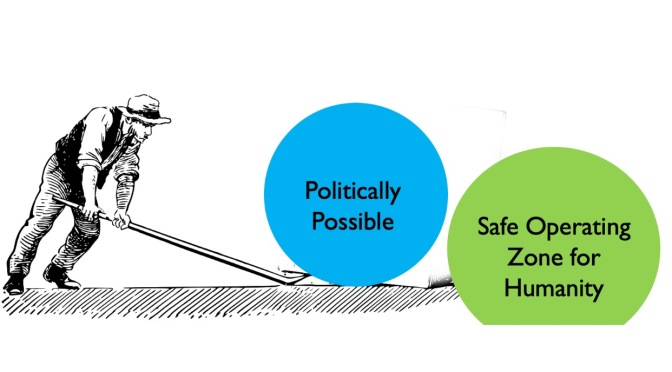
I was chatting the other day (informally) with someone involved with NetZero planning for the UK Government. I was spitballing my usual ideas, which were all getting shot down as politically infeasible: “No one will vote for that”. It felt to me like the sets of actions which were considered ‘politically possible’ and those that were ‘ecologically necessary’ (for continued human flourishing) had no point of convergence.
He was more optimistic though, believing that there were actions that were both politically feasible and suitably sufficient (at least regarding mitigating climate change/NetZero by 2050).
[ps. For the record, I hold that NetZero is NOTZero & its the wrong target in the wrong timeframe]

But drilling down into what occupies the intersection of those sets of the politically feasible and the suitably sufficient I found it difficult to share the optimism. A general theme of electrification was mooted, but when it got down to the low carbon energy basis of NetZero, I felt it seemed to fall to this:

You could maybe add Nuclear Power to the fluke/vapourware/”First World First” mix as an unfavourable (yet still preferable to lifestyle change) option for the Western consumer/electorate. I found it hard to share his confidence that the ‘politically viable’ was going to keep us in the safe operating space for humanity.
Taking a precautionary view that, perhaps, we should base any plans to use technology to save us from runaway climate change on actually existing technology tends to put you in the box labelled Doomer. The legacy of the Simon–Ehrlich wager and Julian Simon’s The Ultimate Resource continues to inform the contemporary Promethean visions of eco-modernism, some protopianism as well as the base level climate-change policies of Western democracies. Time preferences that avoid difficult decisions in the present, in favour of novel redemptive technology in the future avoid testing what is politically viable right now.
[I also think that we are an ingenious species and that many relevant technologies will, no doubt, be developed under the pressure of climate collapse – I don’t want to bet everything on that eventuality though. If we are including giant space mirrors in the realm of the possible then I think middle-class lifestyle change might have a place on the table too.]

I’m not saying that lifestyle change is an easy sell, nor is it an easy task to expand the horizon of political viability – but governance fit for a liveable future is obliged to go beyond 19th Century paradigms and their formulations of realpolitik and reform. Meanwhile the horizon for effective climate mitigation is shrinking, 2050 is perhaps 6 political terms away – the intermediate marker point of 2030 perhaps 2 or 3.
Galbraith’s advice that, contra Bismarck, ‘Politics is not the art of the possible. It consists in choosing between the disastrous and the unpalatable’ is one starting point, but the imaginative imperative is to cultivate an appetite for novel futures outside the calamitous. The duty of political actors is to find a route there. That’s why I’m #solarpunk.
Expanding the horizon of political viability requires thinking in system terms and the courage to find new points of leverage to effect system change. Our current political repertoire is not fit for purpose.

Benjamin Bratton’s new book The Revenge of the Real; Politics for a Post-pandemic World critically positions biophysical reality against the restricted political viability of contemporary realpolitik: ‘Sooner rather than later, something must and will give’.
Right now, a few weeks out from the 26th Conference of the Parties to the United Nations Framework Convention on Climate Change, it feels like the best that we can hope for is that those parties, like the Americans in a remark oft attributed to Churchill, ‘can… be trusted to do the right thing, once all other possibilities have been exhausted’. But every year spent on ‘other possibilities’ narrows our future prospects.
Whichever way it goes now, individuals and communities are tasked with adaptation. Adaptation to floods, hurricanes, water shortages, wet-bulb temperatures, wildfires and worse. Adaptation to empty shelves, hospital waiting lists, rising prices, unfit homes, wage stagnation, zero-hours contacts.
If we want societal solutions to these problems we had better make the ecologically viable, politically viable again.
